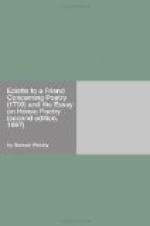And in this Action, the Poet ought, as Rapin tells us, to invert the natural Order of things, not to begin with his Hero in the Cradle, and write his Annals instead of an Epic Poem, as Statius in his Achilleid, the Reason of which seems plain, because this would look more like History than Poetry. It’s more agreeable, more natural, in some Sence, to be here unnatural; to bring in, by way of Recitation or Narration, what was first in order of time, at some distance from that time when it really happened, which makes the whole look unlike a dull formal Story, and gives more scope for handsome Turns and the Art of the writer. Another Reason why a whole Life is not ordinarily a proper Subject for Epics, is, because many trivial Accidents must be therein recited; but if a Life can be found in which is nothing but what’s diverting and wonderful, tending besides to the perfecting the main Action, and the Order of time revers’d in the whole, the Case would be so much altered, that I think their Rules would not hold.
For the Form of Epic, which comes next in view, ’tis agreed on all Hands to be Recitation or Narration. Bossu says, The Persons are not at all to be introduced before the Eyes of the Spectators, acting by themselves without the Poet; not that he’d hereby exclude the Poet from introducing the persons telling their own Story, or some one of them that of the principal Hero: for great part of Epic is thus far Dramatic. And thus Virgil manages his second and third Books by way of Recitation, and that by his Hero himself, making him give Dido a long account of the Wars of Troy, and his own Actions, tho’ thereby he falls into the Impropriety of commending himself, with a—sum pius AEneas. Vida takes the same way of Recitation, wherein he employs two or three of his six Books; and Milton follows them both, tho’ less naturally than either; for he introduces our Saviour, in his Paradise regain’d, repeating a great part of his own Life in Soliloquy, which way of Discourse includes, in a Wise Man especially, so much of Calmness and deep Reflection, that it seems improper for the great and noble Turn required in such a Work, unless in describing a Passion, where it may be more lively. All that they mean by not introducing the Parties, is not doing it as in a Tragedy: they are not to be brought in abruptly to tell their own Tale from the beginning, without the appearing Help of the Poet, as Actors in a true and proper Drama. And this Narration, says Rapin, should be simple and natural; but the greatest difficulty is, not to let its Simplicity appear, lest it thence grow disagreeable, and the chiefest Art in this, consists in its Transitions, and all the delicate surprising Turns, which lead the Reader from one thing to another without his thinking whither he’s going, or perceiving any Breach or so much as a passage between ’em; after all, the more Action there is in Epic, still the more Life there will be. A Poet may, I find, easily fall




